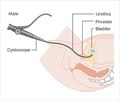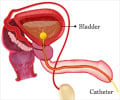Enhanced quantitative urine culture detects more types of bacteria that causes urinary tract infection and helps in the treatment.

‘In Enhanced quantitative urine culture (EQUC), samples are incubated for 48 hours in three growth media. The EQUC test detected one or more bacteria species, for a total of 110 species.’





Urinary tract infections (UTIs) are among the most common reasons for visits to doctors' offices and emergency departments. A UTI is an infection in the urinary system, usually involving the bladder and urethra. Women are at higher risk. Symptoms include a strong urge to urinate, a burning sensation when urinating, pelvic pain and urine that appears cloudy or discolored. Antibiotics often are the first-line treatment.
The current test for urinary tract infections is called a standard culture. In a lab, a sample of urine is added to a substance (growth medium) that promotes the growth of bacteria that may be in the urine. Two growth media are used and samples are incubated for 24 hours in room air.
The new test, called enhanced quantitative urine culture (EQUC), uses a higher volume of urine. In addition to room air, samples are incubated in air containing a high concentration of carbon dioxide and in an anaerobic (absence of oxygen) environment. Samples are incubated for 48 hours in three growth media.
The study enrolled 150 urogynecologic patients, half of whom reported symptoms of UTIs. Urine samples from the patients were subjected to both the standard culture and the EQUC tests.
Advertisement
Loyola researchers will soon launch a clinical trial to investigate whether using the EQUC method could improve the clinical care of women with UTIs.
Advertisement
The clinical trial will be headed by Elizabeth Mueller, MD, Loyola Medicine division director of female pelvic medicine and reconstructive surgery and a co-author of the EQUC study.
"EQUC is a tool," Dr. Mueller said. "Now we have to figure out the best way to use it."
Source-Eurekalert















